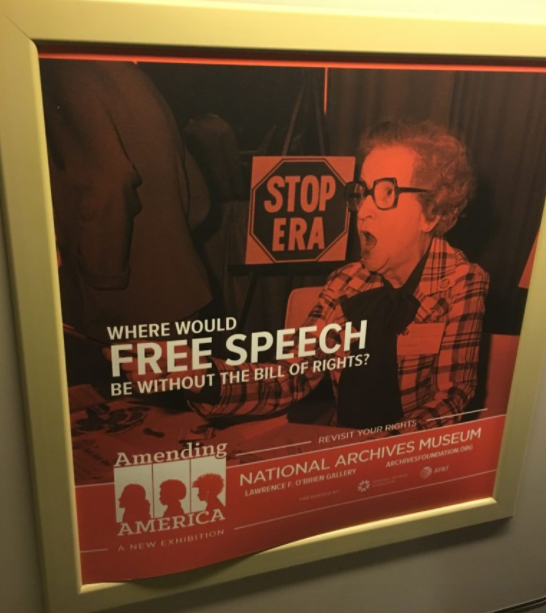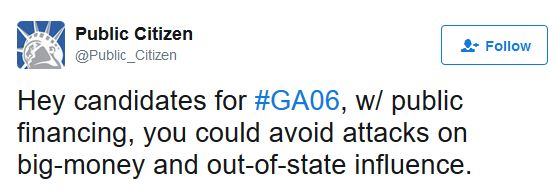Can a subway system ban advertisements that convey a controversial political opinion? What about an ad that asks riders to “embrace humanity and inclusion”?
That may seem like a strange combination of scenarios, since we often associate politics with divisiveness, but not so much with “humanity and inclusion.” Yet, this comparison is necessitated by the fact that the Washington Metropolitan Area Transit Authority (WMATA or “Metro”) seems to see no difference.
Since 2015, WMATA has maintained a blanket ban on ads that seek to influence public policy or public sentiment. That rule was a response to one group’s attempts to place an ad in several Metro stations depicting a cartoon of the Islamic Prophet Muhammad, leading to security concerns about a violent backlash. However, the policy has been criticized as overly broad: WMATA also rejected Christmas-themed ads out of concerns they sought to “promote religion,” rejected ads for a book written by media provocateur Milo Yiannopoulos, and rejected ads by organizations like PETA. These actions have led to lawsuits from the Archdiocese of Washington and the ACLU.
The “humanity and inclusion” ad comes from a group called, well, Humanity & Inclusion – a nonprofit disability advocacy group. Perhaps unsurprisingly, WMATA’s decision has faced backlash. Humanity & Inclusion’s leadership pointed out that there was no advocacy “ask” made in its ads, and Congressman Jamie Raskin of Maryland went further by questioning why ads promoting political or social messages face more restrictions than those conveying commercial messages (although he himself has introduced legislation that would restrict political speech).
This is a question worth considering not just in terms of subway ads, but other forms of free speech as well. Political speech is one sort of “social message” that lawmakers are depressingly comfortable with regulating, despite its centrality to the history of the First Amendment and its necessity to a free, democratic society. They do this by, among many other things, restricting campaign donations or political messages through different types of media.
But sometimes the line between what is and is not political is blurry. Can an ad be political without advocating for a specific candidate or bill? When does a message become “divisive”? Does it require a 50/50 split between agreement and disagreement, an 80/20 split, a 99/1 split?
It is tempting to try to frame political speech regulation in terms of extremes, to make such policies more black and white without grappling with the consequences in more nuanced cases. But without drawing a definitive line somewhere, regulations intended for even the most “extreme” viewpoints can morph and expand over time, swooping up increasingly innocuous viewpoints. It all depends on who is drawing the line.
The case of WMATA demonstrates just how quickly this process can occur.
The Chairman of the Metro Board at the time the ad policy was first implemented admitted that “[m]y understanding was – and I voted for it – this was the quickest way we could assure that the offensive anti-Muslim ads would not go on the buses.” The desire to make a clear-cut ruling restricting one form of speech ended up punishing other forms of speech as well.
Yet, rather than own up to its mistake and attempt to correct its overstepping, WMATA has defended its power to broadly restrict speech. D.C. Council member and current Metro Board Chairman Jack Evans complained, “we don’t want to spend the time and the energy and everything trying to figure out what ads we should run and what we shouldn’t.” In that case, it sounds like the solution would be for WMATA to simply not police ads for politics it finds extreme. Instead, Evans uses this complaint as an excuse to put even less thought into regulating speech, saying Metro had “no intention of revisiting this [decision] at all.”
Evans’ attitude demonstrates that, for those who wish to restrict speech and have broad power over a particular medium – like subway ads – it is often more convenient to have a broad policy that can be applied to many types of viewpoints, which ultimately means that a public agency like WMATA errs on the side of censorship. That is obviously unacceptable under First Amendment principles.
WMATA’s ad policy is a cautionary tale of how the power to restrict one form of speech can easily apply to many others – particularly when other institutions, like the FEC or Congress, also grapple with how to regulate ads. The best solution is to refrain from restricting speech in general. This is a lesson that applies to far more than just the posters you see on your morning commute.














